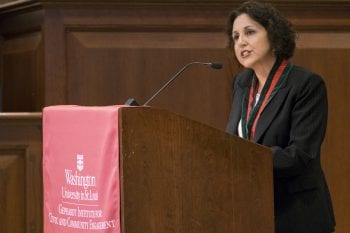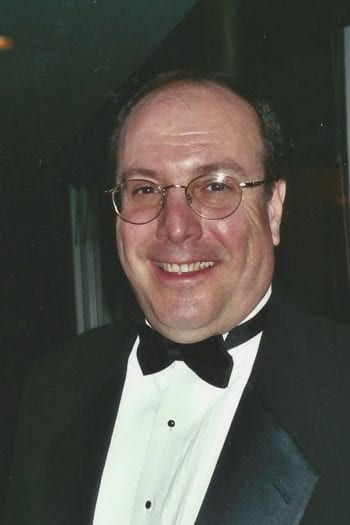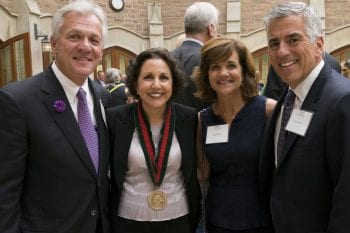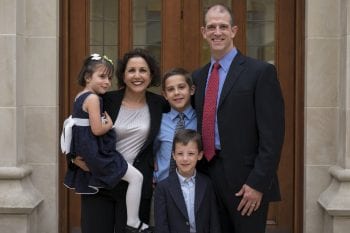Stephanie N. Kurtzman was installed as the Peter G. Sortino Director of the Gephardt Institute for Civic and Community Engagement on September 11, 2017. Her installation address is reprinted below. View a video of the event here.
Chancellor Wrighton, Senator Danforth, Congressman Gephardt, and Mrs. Sortino: I am honored and humbled that you have entrusted me to lead the Gephardt Institute for Civic and Community Engagement in the name of Peter Sortino. The Gephardt Institute envisions a world brimming with engaged citizens who look for what we can each do to uplift the common good, and it is a living sign of Washington University’s investment in contributing to the health and vitality of the St. Louis region.
I am honored beyond measure to carry the legacy of Peter Sortino. I have come to know him through the heartfelt public remembrances of his life and legacy. As I have read these materials that beam with affection, admiration, and gratitude for Peter Sortino, I have been stunned to see my own aspirations as a leader mirrored in the reflections of his civic leadership. Beyond his many lasting contributions that enrich St. Louis every day, I am struck by the way in which Peter Sortino led with humility, integrity, and empathy. His style was marked by his legendary work ethic; his effectiveness at getting things done; his ability to listen and build trust across political, geographical, and racial lines; and his selfless motives, focusing only on what was important for the region.
As I stand here today, I deeply appreciate this special recognition, and I also view it as a challenge. I accept the challenge to lead with the same level of humility, integrity, focus, enthusiasm, and work ethic that Peter Sortino exemplified. I accept the challenge to listen, and then listen more deeply; to lead across the many lines that dare to divide us; I accept the challenge to favor collective progress over ego; to nurture coalitions and partnerships that advance the common good.
In a few weeks when I celebrate the Jewish high holidays, our rabbis will tell us that these days are “awesome and full of dread.” I have thought about this line many times as I prepared for my remarks today. Today is truly awesome. I am blessed to have all of my parents, step-parents, and in-laws joining me here. I see dear friends and family – including my husband and best friend, David; and our three young children. I have countless mentors who I have studied over my twenty years at the university – many of whom may not recognize themselves as my mentors and role models. I see staff and faculty colleagues who are among the finest human beings I have had the privilege to know, including our exceptional Gephardt Institute staff. I see community partners and local leaders who share in our vision of a thriving region. We have champions and supporters who believe in the Gephardt Institute as a powerful vehicle for effecting positive change in communities. And, I have been privileged to know two decades worth of students and alumni who exemplify our greatest hopes for a world that is more just, equitable, sustainable, peaceful, healthy, and kind. Thank you all for your presence today, and for your engagement with the Gephardt Institute. Indeed, today is truly awesome.
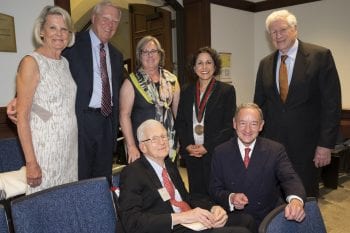
Today is awesome, and it is also full of dread. Because today is September 11th. Today marks the 16th anniversary of the most catastrophic and painful day in our country’s collective memory. It was a day of violence and destruction, loss and grief, despair, fear, and sheer heartbreak. It was, in a word, dreadful. At the same time, September 11th was a day that showed us love, humanity, solidarity, and generosity. Father Joseph Bayne, a chaplain for fire and emergency service personnel at Ground Zero, wrote: “No, I did not see the devil’s face at Ground Zero. I saw the face of God in the people working, caring, sweating, crying, rescuing, recovering, and being very spiritual in their very humanness.”
It is this tension between awesome and dread, the tension between polarities that marks so much of the human experience. The tension between grief and healing, between loss and renewal, between vulnerability and strength, between fear and hope. We face these tensions in our region, our nation, and our world. I believe that to find a way forward, together, it is our responsibility to embrace both: To see people in their strengths, and also their vulnerabilities. To encounter what may seem different, strange, or uncomfortable, and seize the opportunity for learning and compassion. To bear witness to hate and violence, and respond with love. To recognize both the challenges and the assets in our communities. To experience the deep polarization in our nation, and envision civil discourse, compromise, and healing. To name injustice and disparity, while striving for equity and access. To approach daunting problems with expertise and conviction, and also bring humility and deference. To stand in the face of urgent challenges in our communities, and choose hope, and choose action.
I saw these tensions firsthand when I visited Ground Zero in July. At the National September 11th Memorial in New York City, I learned about the Callery pear tree. This once thriving tree was found severely damaged, burned, and broken in the wreckage of the World Trade Center, and was nearly left for dead amid the tragic rubble. Yet somehow, the tree was still sprouting leaves. It was rescued by the Department of Parks and Recreation, and nursed back to health in the Bronx. A full nine years later, the tree was replanted at the site of the September 11th Memorial and each year, its seedlings are shared with communities across the nation that have endured tragedy. This gorgeous tree, now called the Survivor Tree, thrives at over 30 feet tall with a full body of leaves, a living reminder of resilience, survival, and hope.
Since visiting the September 11th Memorial and witnessing the splendor of the Callery pear tree, I have thought a lot about what it means to thrive. When we thrive, we flourish, we prosper, we grow, we progress. And we often thrive despite challenging circumstances. Thriving – this is what we all want for our children, our families, our neighborhoods, and our communities. At Washington University, this ideal dates back to the 1800s when our co-founder, William Greenleaf Eliot, said, “As citizens of St. Louis, we desire to make our city great and strong.”
In a nutshell, this is what we’re doing at the Gephardt Institute: We are here to support Washington University in doing our part to foster thriving communities. We are passionate about ensuring the health and vitality of our region. We recognize that our fates are bound up together, that we are all stronger when our communities are strong, that Washington University thrives when St. Louis thrives. We feel the urgency of both local and global conditions that affect people’s lives – their ability to thrive – and we stand on the side of both hope and action.
We see monumental, consequential challenges that span our region, nation, and world, and we stand on the side of solutions. We stand on the side of partnership. We believe, like Peter Sortino, that we are most effective when we work together. We believe in putting our heads together, setting common tables, bridging the best assets of the university – our combined knowledge, compassion, and energy – with the expertise and vision of those who live in and lead our communities.
The Gephardt Institute believes that thriving communities are possible; and that it is both our privilege and our obligation as members of the Washington University community to do our part to foster thriving communities.
I know it is easier to talk about thriving communities, and much harder to achieve them. We may even disagree about what it means to thrive. To be sure, this work is complicated. It is messy, demanding, and full of both tension and contradictions. It is also beautiful, fragile, full of promise – and necessary. It is our sacred calling, perhaps not to fix things nor to complete the work, but to be present to something bigger than all of us. To inspire and harness the best of our minds, hearts, and abilities and respond to the cry for survival, the possibility of change, the hope of our collective imagination: That all people in our communities have the opportunity to thrive – in health and safety, in learning, in opportunity, in prosperity, joy, and peace.
This work requires that we at Washington University harness the best of our knowledge, energy, and will, and align ourselves with the real and consequential needs in our communities. It is not for us alone to define the needs, nor the solutions. Rather, as I have learned from the civic legacy of both Peter Sortino and Congressman Gephardt, it is our responsibility to listen. We have the opportunity to more fully embrace forms of teaching and learning that are complementary to the books, lectures, workshops, and discussions that universities are known for. We can also look to the experts in our communities to help teach our students; apply our knowledge in ways that bring benefit to the community; and find out if our ideas hold true to the lived experience of our neighbors.
When we get off campus and stand on the asphalt and soil in our communities; when we look others in the eye and hear their stories, struggles, triumphs, and dreams; when we learn the people’s history of our neighborhoods; when we critically analyze the intersection of what we read and what people experience; when we approach seemingly intractable challenges facing people’s lives….it is at these moments that we have the best opportunity to contribute substantively to the vitality of our region, to earn the trust of local citizens and leaders who know their communities best, and to effectively prepare our students for lives dedicated to improving the human condition.
This work is at once local and global. We are grounded in St. Louis and owe our greatest responsibility to our neighbors across the region. And yet, in a world of fraying boundaries and interconnectedness, we are also obligated to communities far and wide. We call upon our students and alumni to listen to the lessons of history and the voices of people who suffer; to be informed consumers of the barrage of news and opinions that saturate our lives; to dialogue, learn, and collaborate across ideological lines; to find their agency in a world crying for their leadership and their sustained commitment; to apply their Washington University education to the deep challenges facing communities around the globe.
Some of our alumni will become remarkable civic leaders on the national and international stage; others will bring a civic lens to their work, seizing opportunities for positive impact through their profession; many will make personal commitments to living their lives in ways that advance the common good. And, if we do our job right, all will understand their inherent obligation, as Washington University students and graduates, to look outside of themselves and contribute wherever possible to the health and vitality of our communities.
This work of civic and community engagement is not for the faint of heart. It is a long and winding road, requiring commitment, frequent recalibration, reciprocity, and the resilience to withstand obstacles and detours. It leans on theory and ethics, yet must be applied with care; with empathy, integrity, and constant attention to unintended consequences.
When we approach the community, good intentions alone are rarely enough to assure positive and sustained impact in people’s lives. We must also bring sensitivity to historical, social, and political contexts; the training and skills necessary to serve others effectively and to advance policy that fosters lasting change; and deep acceptance that even at one of the finest universities in the world, our answers may not be the right ones. Our questions may not be the right ones. Indeed, our fates are tied up together, and it is partnership that offers the greatest promise of effective community engagement that changes lives for the better.
My great hope as I lead the Gephardt Institute is that you will find us to be good partners. We are eager to partner with you to build initiatives that foster thriving communities. We want to put our heads together with yours to figure out new and better ways to build meaningful connections between Washington University and our neighboring communities. We seek opportunities to work together to mobilize and equip the Washington University community to actively contribute to the life and health of our region. We want to bridge our expertise and yours to assure the best possible learning for our students, combined with the best possible outcomes for our communities. We hope to be at the table for shared problem-solving, focusing our energy on regional priorities. And, we aim to be trusted partners committed for the long haul – persisting like the Callery pear tree, believing at times against the odds that hope, collaboration, and hard work will win.
Nearly twenty years ago, I arrived in St. Louis fresh from graduate school for a dream job that I thought would last 3 or 4 years before I continued making my way back to the west coast. Like Peter Sortino, I am a transplant who fell in love with St. Louis. And I fell in love with Washington University, the place that has nurtured me as a person and a professional for two decades. I owe my deepest gratitude for the opportunity to serve this great university, for your investment in me, and for your investment in the Gephardt Institute.
I am fortunate beyond measure to work with a staff that brings deep talent, vision, and dedication to our work. And yet, we cannot possibly do this alone. The Gephardt Institute is of and for the entire Washington University community – undergraduate and graduate students, faculty, staff, alumni, parents, and friends – and through them, through you, we stand ready to serve and partner with communities near and far, to affect real and lasting change where it is needed.
I invite you to consider how you can connect with this vitally important work. I invite you to see yourself at our growing table, and to trust that you can bring your unique background, talents, and aspirations to us. We want to hear about your passions, concerns, and hopes for the world. We welcome compassionate hearts with or without prior community engagement experience; political ideologies across the spectrum; every academic discipline; and all professions.
I am reminded of a poignant speech offered on the eve of commencement in May to a cadre of graduating students. Steve Frappier, one of our graduates from the class of 2000, shared his harrowing story of surviving the January shooting in the Fort Lauderdale airport, which left shrapnel in his hand and a bullet embedded in the laptop he carried in his backpack. Since that time, Steve now identifies himself a citizen-activist, advocating for the advancement of mental health services. At the close of his speech, Steve challenged us to prepare for those moments when we are called to action. He said: “Will I have the opportunity to affect positive change, or not?” You might look around, and realize that you are humbly and uniquely equipped to be one to catalyze something within a specific place and moment. Prepare to listen to your conscience and do something. And alongside the necessary times you have to ask yourself “Should I do this?” do not hesitate to ask yourself, with clarity of conscience, “What if I don’t?”
What if we don’t? And, what if we do? What if we all choose, in our own ways, to engage in our communities? What is possible if we come together around daunting challenges and find a clearer path to change, with strength in our collective vision and resources? What if we listened to each other more and let ourselves be influenced by the unique perspective, life experience, and expertise that others can bring?What if we were to nurture ailing communities like the Callery pear tree was nursed back to health? What would it be like to see people thriving in their lives and communities, everywhere we turn? What if all of Washington University got involved and invested in the advancement of thriving communities?
These are the questions I am privileged to ask every day as I lead the Gephardt Institute. The answers, however, lie in our collective conscience. The needs are real and they are urgent. The opportunity is before us to do more, to do better, to make civic engagement a hallmark of Washington University, and, like the Callery pear tree, to stand on the side of thriving communities.
